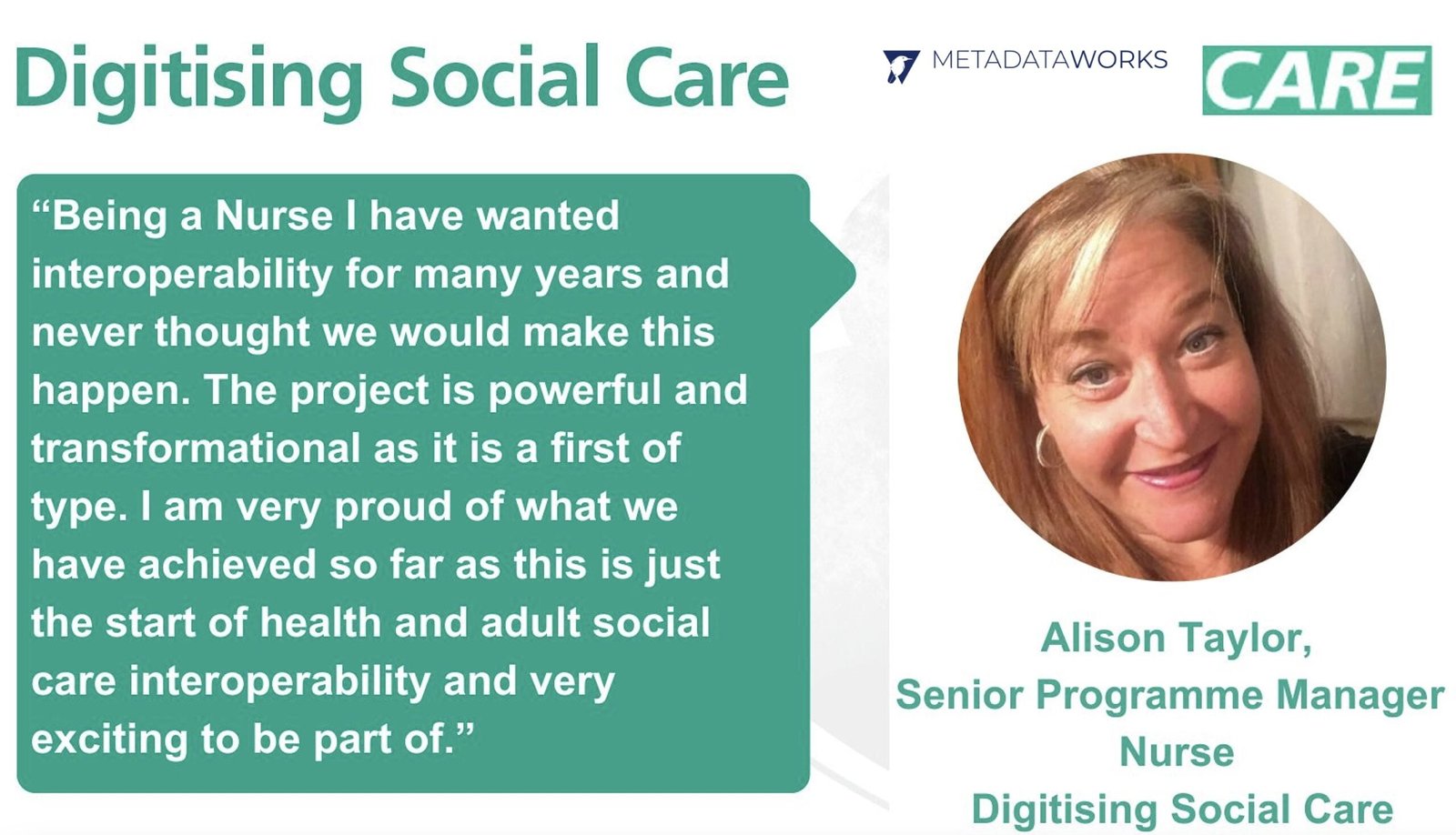Digitising social care represents an exciting leap forward in the healthcare landscape, offering a multitude of benefits for both caregivers and those receiving care. One of the key advantages lies in granting carers seamless access to critical information, ensuring they have a comprehensive understanding of an individual’s needs and medical history. This, in turn, translates to better outcomes as care can be tailored more effectively. Innovative technology plays a pivotal role in this transformation, enabled by the creation of data standards and systems to share data. This initiative sets out to achieve several vital objectives, including the establishment of consistent data collection practices, standardisation of data formats, and compliance with regulatory requirements and best practices. Moreover, by reducing the administrative burden associated with data entry and reporting, it streamlines operations, allowing caregivers to focus more on providing quality care. The alignment with broader healthcare standards ensures efficiency and prevents redundant efforts. Additionally, the specialised data model within the programme not only integrates with existing healthcare frameworks but also caters specifically to the unique needs of social care, opening doors for technological advancements and the seamless integration of assistive technologies in the sector. Overall, digitising social care promises a brighter future with improved care quality and operational efficiency.
Challenge:
The lack of a standardised approach to managing social care data in the UK has posed significant challenges. Key information about a person’s care cannot be efficiently shared between providers, commissioners, and national bodies due to proprietary data formats and fragmented data practices. With over 27,000 independent organisations in the sector, this lack of standardisation has led to duplicated efforts, care coordination inefficiencies, compromised care quality, and limited national-level insights.
Results:
Within 16 weeks, MetadataWorks addressed these challenges by mapping the UK social care data landscape, creating a repository of national social care collections, data standards, and terminologies. They developed an openly accessible consolidated tool for standards dissemination, a glossary, and a metadata catalogue, all accessible through an intuitive web interface. This effort resulted in:
– 2 new national standards
– 24 catalogued standards
– 24,919 catalogued data concepts
– 381 catalogued glossary definitions
MetadataWorks has used this foundation to launch a new standard for Adult Social Care, which will become mandatory for all Social Care Providers and Suppliers in England. The new standard is available at www.data.digitalsocialcare.co.uk.
“Being a Nurse I have wanted interoperability for many years and never thought we would make this happen. The project is powerful and transformational as it is a first of type. I am very proud of what we have achieved so far as this is just the start of health and adult social care interoperability and very exciting to be a part of.” Alison Taylor (Senior Programme Manager – Nurse – NHSE Digitising Social Care)
Background:
Digital Social Care UK, funded by the Department of Health and Social Care, aims to support the digital transformation of the UK’s social care sector. They identified a lack of standardisation and fragmented data practices as fundamental obstacles to digital transformation. In collaboration with MetadataWorks, a strategic initiative was launched to create a consolidated metadata management system, reducing the burden of data submission, promoting research, and improving care quality.
The Challenge:
The fundamental challenge was the lack of visibility into the data landscape, inconsistent data management practices, fragmented technology, and a lack of standards. Disparate terminology compounded the problem, as the same term meant different things to different organisations. Additionally, there was no single social care database; data was distributed across different organisations.
The Solution:
MetadataWorks adopted a phased approach, starting with laying the foundations for social care standards and technology implementation:
- Discovery and Harmonisation:
– Gathered datasets, standards, and terminologies.
– Mapped them into a harmonised glossary.
– Leveraged a metadata catalogue solution for streamlined processes.
– Automated mapping identified duplications and terminology discrepancies.
- Standards Development:
– Harmonised existing standards.
– Developed a conceptual data model for seamless data exchange.
- Standards Implementation and Dissemination:
– Used the Metadata Catalogue to document, map, and collaborate on data management and governance.
– Publicly launched the central catalogue, including the Metadata Browser, Standards Registry, and Terminology Server, through an open web interface.
– Actively engaged with stakeholders for feedback and buy-in.
Technology Implemented:
– Federated Data Catalogue: Enabled data discovery and improved utilisation for care providers.
– Standards Repository: Simplified access to standardised metadata and specifications.
– Terminology Server: Indexed, enriched, and provided easy access to social care data definitions, enhancing data understanding and collaboration.
Results:
MetadataWorks’ solution is transforming the social care sector in the UK by delivering the first national social care data catalogue and first data standard for an Adult Social Care Record. Over 3000 members of the social care data community have already engaged with the standard and catalogue. This centralised repository and metadata management system lay a strong foundation for the future of social care in the UK and the Adult Social Care Record will be mandated for all Social Care Providers and Suppliers in England.
The Future:
As the sector adopts streamlined data standards, efficient data sharing, and enhanced collaboration, the program is set to deliver improved care outcomes, enhanced service provision, and informed policy decisions. The Adult Social Care Record model goes beyond mere integration with existing healthcare frameworks; it is designed to address the distinctive requirements of the social care sector. This tailored approach creates opportunities for substantial technological advancements and the effortless assimilation of assistive technologies within the field. In essence, digitising social care holds the promise of a more promising future, characterised by enhanced care quality and increased operational efficiency. This means that the sector can embrace cutting-edge innovations and benefit from a seamless incorporation of assistive tools and technologies to ultimately deliver better care services and streamline administrative processes.
Discover more about MetadataWorks:
MetadataWorks makes public sector data easier to use and manage, ensuring it is open, reliable, and utilised effectively for the betterment of society.

